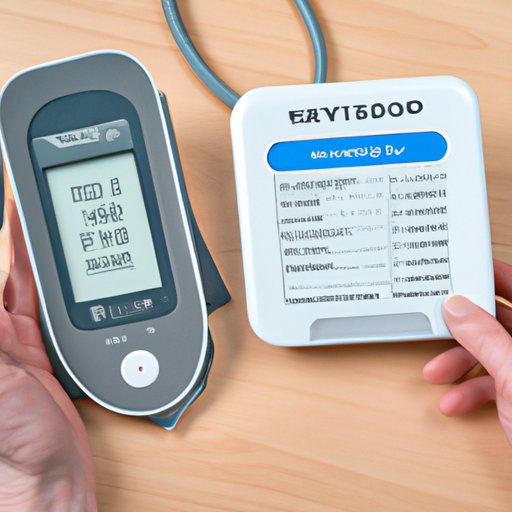
Introduction
Kidneys play an essential role in our body by filtering waste and excess fluids from our blood and creating urine. They also produce hormones that regulate blood pressure and control the production of red blood cells. Monitoring kidney function is crucial for early detection of acute or chronic kidney disease. In this article, we will explore how to check kidney function at home with practical tips and useful information.
Utilizing Home Test Kits for Measuring Kidney Function
Home test kits are available for measuring kidney function. These kits include dipsticks that can be used to measure particular levels of chemicals and substances in your urine.
Make sure to buy a reliable and accurate test kit. Follow the instructions and gather all necessary materials. Urinate in a clean container, dip the test strip in the urine and leave it for the recommended amount of time. Then, compare the color of the strip with the chart provided in the kit to measure levels of protein, glucose, ketones, and other substances.
Measuring Urine Output and Color
Volume and color of urine can indicate kidney function. Keep track of how often you urinate and how much urine you produce daily. Typically, adults produce around 1 to 2 liters of urine per day.
The urine color can give you hints about your hydration status. A light yellow or clear color indicates that you are adequately hydrated, while a dark yellow or amber color could be a sign of dehydration.
Monitoring Blood Pressure
Kidney problems and high blood pressure are closely linked. High blood pressure can cause damage to your kidneys, and kidney disease can cause high blood pressure. Therefore, monitoring blood pressure is essential for kidney health.
You can measure your blood pressure at home using a blood pressure monitor. Sit comfortably, and make sure your arm is supported and at heart level. Follow the instructions provided with the device to measure your blood pressure accurately. Keep track of your blood pressure readings and share them with your healthcare provider.
Tracking Creatinine and Blood Urea Nitrogen (BUN) Levels in Blood
Monitoring creatinine and blood urea nitrogen levels in the blood can help observe kidney function. Creatinine is a waste product that is produced by muscles and excreted by the kidneys. BUN is a waste product that is produced by the liver during protein metabolism, and it is excreted by the kidneys.
You can measure these levels at home using at-home testing devices. These devices are easy to use and provide accurate results. Make sure to follow the instructions carefully and share the results with your healthcare provider.
Tracking Protein Levels in Urine
Protein levels in the urine are often used as an indicator of kidney damage. Healthy kidneys filter out excess protein from the blood and excrete it in the urine. If the kidneys are damaged, protein leaks into the urine, causing an increase in protein levels.
You can measure protein levels in your urine using dipsticks that work similarly to at-home test kits. Follow the instructions provided with the kit and share the results with your healthcare provider.
Keeping a Food and Drug Diary
Certain drugs and foods can put a strain on the kidneys and cause kidney damage. Keeping a food and drug diary can help you track what you consume and identify any possible culprits that could be harming your kidneys.
Write down all the foods you eat and the medications you take, including vitamins and supplements. Share this information with your healthcare provider and ask for any recommendations or changes in your diet or medication regimen.
Living a Healthy Lifestyle
Living a healthy lifestyle is essential for maintaining kidney function. Smoking and consuming alcohol can cause damage to kidneys, so avoiding or limiting these substances can help maintain kidney health.
Eating a balanced and healthy diet and staying physically active can help control blood sugar levels, blood pressure, and weight, all of which are important for kidney health. Make sure to stay hydrated by drinking plenty of water and avoid sugary drinks and excessive caffeine intake.
Conclusion
Our kidneys play a vital role in our overall health, and monitoring their function is crucial for early detection of kidney disease. Utilizing home test kits, measuring urine output and color, monitoring blood pressure, tracking creatinine and BUN levels in blood, tracking protein levels in urine, keeping a food and drug diary, and living a healthy lifestyle are all practical ways to check kidney function at home.
Encourage readers to take action and monitor their kidney function regularly. By taking care of our kidneys, we can improve our overall health and quality of life.





